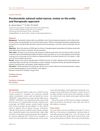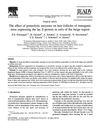2 citations,
June 2018 in “Cosmetics” AMPD is a better and less damaging alternative to ammonium hydroxide for hair bleaching.
 September 2005 in “Morecambe Bay medical journal”
September 2005 in “Morecambe Bay medical journal” Insulin resistance plays a key role in PCOS, and lifestyle changes, weight loss, and medications like metformin can help manage it.
 116 citations,
December 2017 in “International Journal of Women's Dermatology”
116 citations,
December 2017 in “International Journal of Women's Dermatology” Adult female acne treatment should be personalized, considering individual preferences and pregnancy, using various topical and oral medications while managing side effects and resistance.
 June 2016 in “CRC Press eBooks”
June 2016 in “CRC Press eBooks” Sleep problems and skin issues affect each other; poor sleep can worsen skin conditions, and some skin treatments can improve or harm sleep quality.
 3 citations,
January 2000
3 citations,
January 2000 Some alternative therapies for vitiligo show promise but need more research.
 19 citations,
June 1999 in “Steroids”
19 citations,
June 1999 in “Steroids” Different halogens on progesterone derivatives can either block or mimic male hormone effects, depending on their type and amount.
 75 citations,
June 1999 in “Pediatric Clinics of North America”
75 citations,
June 1999 in “Pediatric Clinics of North America” The document concludes that early recognition and treatment of PCOS in adolescents is crucial for managing symptoms and long-term health risks.
 16 citations,
November 2020 in “International journal of pharmaceutics”
16 citations,
November 2020 in “International journal of pharmaceutics” Using longer PEG chains helps nanoparticles penetrate hair follicles better, improving drug delivery for conditions like alopecia.
 26 citations,
December 2020 in “Nature metabolism”
26 citations,
December 2020 in “Nature metabolism” Rapamycin treatment helps with mitochondrial disease by reducing PKC levels.
 4 citations,
February 2018 in “Journal of Investigative Dermatology”
4 citations,
February 2018 in “Journal of Investigative Dermatology” The document concludes that a protein involved in hair growth may link to baldness and that more research is needed on its role in hair loss and skin cancer treatments.
 11 citations,
January 2004 in “Exogenous dermatology”
11 citations,
January 2004 in “Exogenous dermatology” Outside factors like grooming, chemicals, and the environment can damage hair and cause disorders.
 42 citations,
December 2016 in “Cell Death & Differentiation”
42 citations,
December 2016 in “Cell Death & Differentiation” Damaging mitochondrial DNA in mice speeds up aging due to increased reactive oxygen species, not through the p53/p21 pathway.
 19 citations,
January 1997 in “Dermatologic Clinics”
19 citations,
January 1997 in “Dermatologic Clinics” Most treatments for hair loss in 1997 were not effective for most people, and maintaining hair growth was difficult.
 70 citations,
June 2010 in “Clinics in Dermatology”
70 citations,
June 2010 in “Clinics in Dermatology” Certain groups may need vitamin supplements to improve hair health and prevent other health problems.
 October 2003 in “Journal of Investigative Dermatology Symposium Proceedings”
October 2003 in “Journal of Investigative Dermatology Symposium Proceedings” Mice treatments didn't grow hair, a patient treatment may affect immune response, and people with hair loss often feel anxious or depressed.
1 citations,
December 2012 in “PubMed” Permanent wave treatment with thioglycolic acid changes hair structure by altering disulfide bonds.
 42 citations,
January 2011 in “Journal of Biomedical Optics”
42 citations,
January 2011 in “Journal of Biomedical Optics” Infrared and Raman imaging can non-destructively analyze hair structure and help diagnose hair conditions.
 3 citations,
January 2015 in “Nasza Dermatologia Online”
3 citations,
January 2015 in “Nasza Dermatologia Online” Some treatments for autoimmune hair loss work, but JAK inhibitors like tofacitinib are promising for regrowth.
 7 citations,
January 2015 in “Genetics and molecular research”
7 citations,
January 2015 in “Genetics and molecular research” The RORα gene is active in different parts of cashmere goat hair follicles and may be influenced by melatonin, especially in December when hair growth changes.
 1 citations,
March 2023 in “Clinical, Cosmetic and Investigational Dermatology”
1 citations,
March 2023 in “Clinical, Cosmetic and Investigational Dermatology” Current treatments for Alopecia Areata have mixed success, and there's a need for better, more accessible options and support for affected individuals.
 14 citations,
April 2019 in “International Journal of Women's Health”
14 citations,
April 2019 in “International Journal of Women's Health” Some treatments can stabilize Frontal Fibrosing Alopecia, but more research is needed to find effective treatments, and hair transplants often fail.
Protein profiling of forehead skin can help distinguish between frontal fibrosing alopecia and androgenetic alopecia.
 373 citations,
September 2009 in “Obstetrics & Gynecology”
373 citations,
September 2009 in “Obstetrics & Gynecology” The bulletin provides guidelines for diagnosing and managing PCOS, suggesting weight loss, hormonal contraceptives, and diabetes screening, with clomiphene for infertility and various treatments for excess hair.

New treatments for hair loss show promise, including plasma, stem cells, and hair-stimulating complexes, but more research is needed to fully understand them.
7 citations,
January 2020 in “Skin Appendage Disorders” Take care of your hair as much as your face for a youthful look.
 23 citations,
September 2014 in “JEADV. Journal of the European Academy of Dermatology and Venereology/Journal of the European Academy of Dermatology and Venereology”
23 citations,
September 2014 in “JEADV. Journal of the European Academy of Dermatology and Venereology/Journal of the European Academy of Dermatology and Venereology” Laser treatments are the most effective for porokeratotic adnexal ostial nevus.
 3 citations,
March 2016 in “Phytotherapy Research”
3 citations,
March 2016 in “Phytotherapy Research” The new compound was more effective than finasteride in reducing markers of hair loss and prostate issues in cell tests.
 November 2021 in “Austin therapeutics”
November 2021 in “Austin therapeutics” Current treatments for hair loss from chemotherapy are limited, but new methods are being researched.
 5 citations,
July 1999 in “JEADV. Journal of the European Academy of Dermatology and Venereology/Journal of the European Academy of Dermatology and Venereology”
5 citations,
July 1999 in “JEADV. Journal of the European Academy of Dermatology and Venereology/Journal of the European Academy of Dermatology and Venereology” Proteolytic enzymes damage hair follicles by detaching stem cells.
 42 citations,
February 2016 in “Science”
42 citations,
February 2016 in “Science” The document concludes that both internal stem cell factors and external influences like the environment and hormones affect hair loss and aging, with potential treatments focusing on these areas.

























